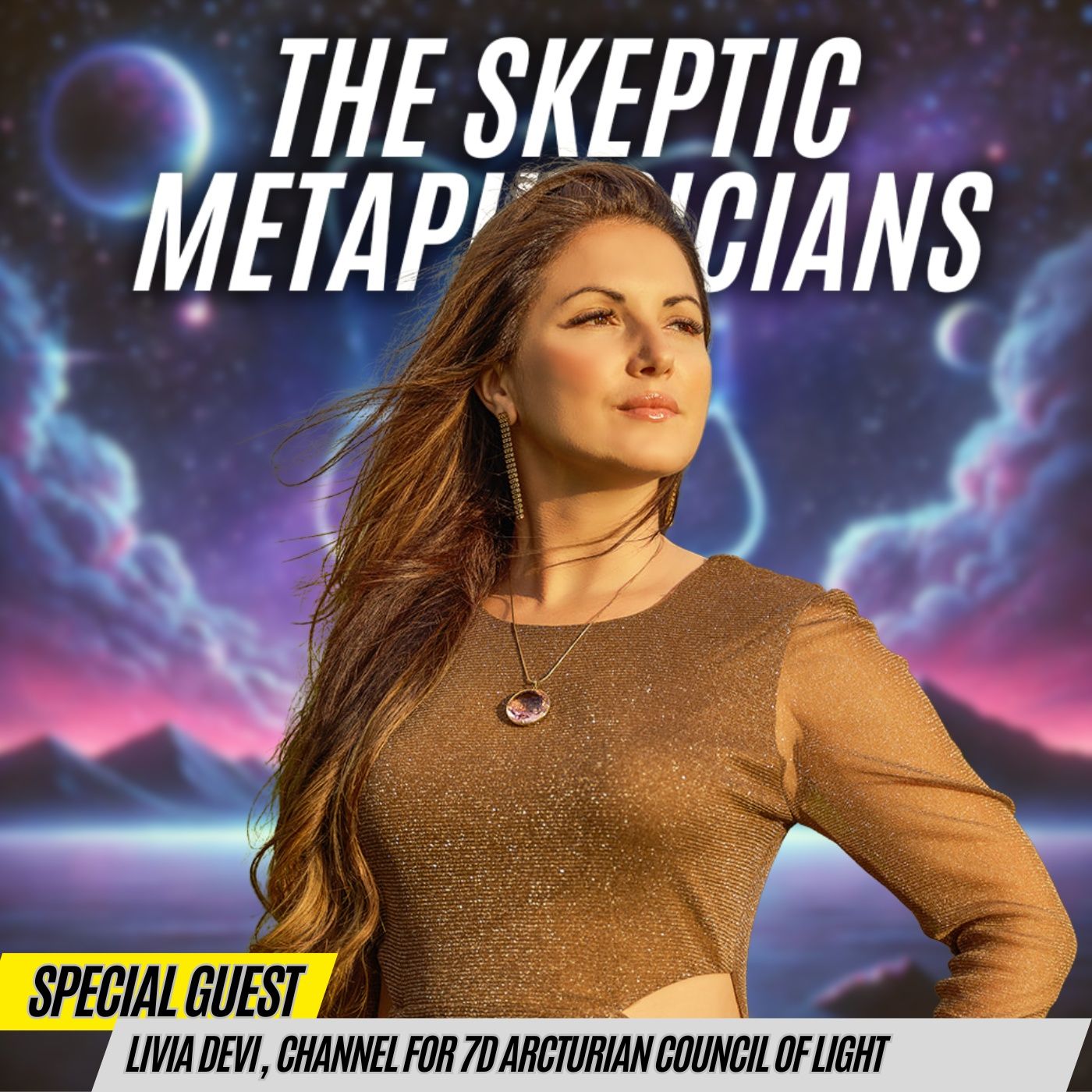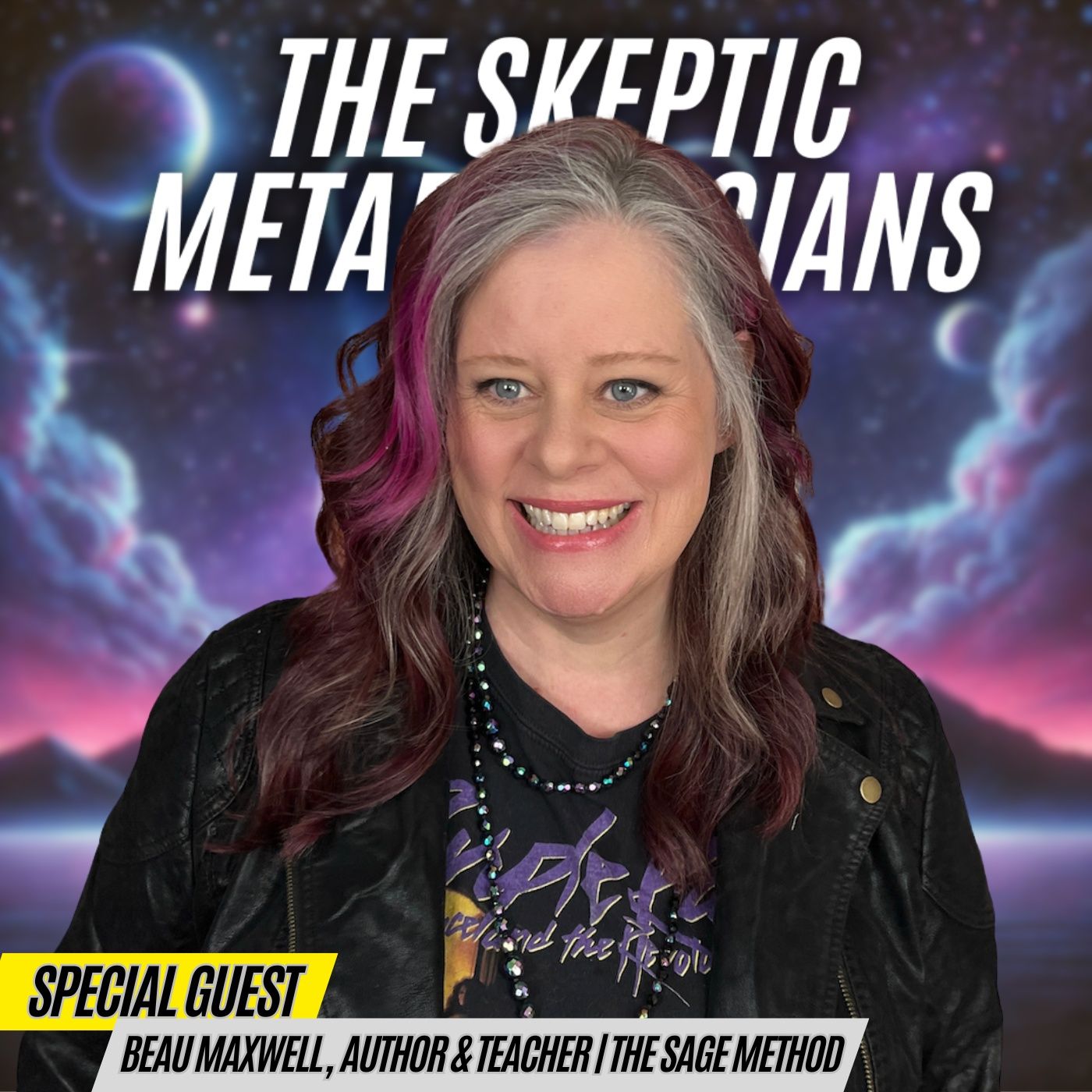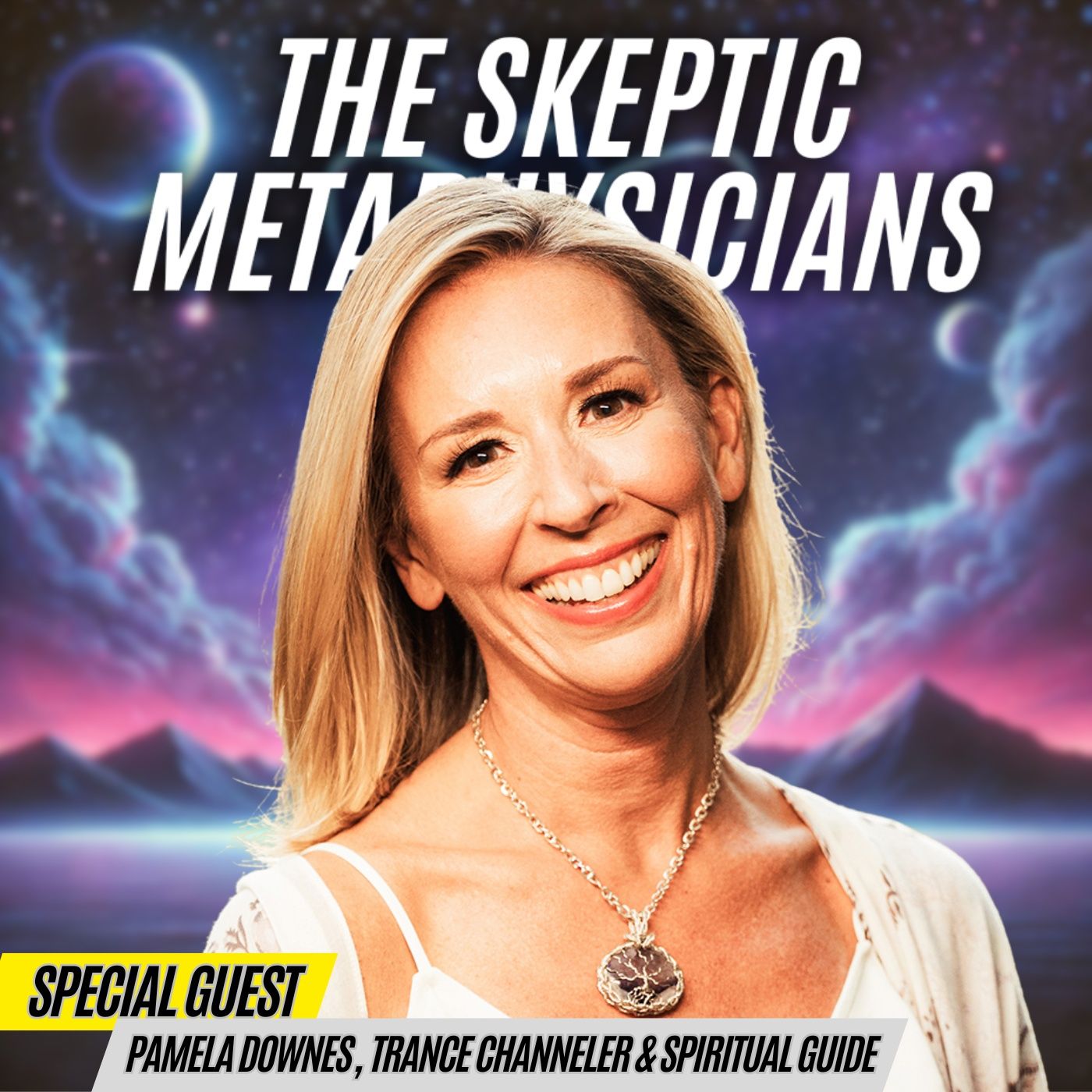"What people call mysticism isn't all that mysterious. It's just a spectrum of awareness. Through that awareness we can tap into other realms and dimensions by shifting our perspective on that spectrum."-- Sadhu Dah10/13/2021The Skeptic...
"What people call mysticism isn't all that mysterious. It's just a spectrum of awareness. Through that awareness we can tap into other realms and dimensions by shifting our perspective on that spectrum."-- Sadhu Dah10/13/2021The Skeptic MetaphysicianReal Magick and MysticismSummaryMagick is real. Mysticism is just a shift in perspective. This is just a very small part of what this conversation with this astounding man revealed. From a day in the life of a mystic, to a deep dive into the truths behind reality and consciousness, this is an episode not to be missed!Info about our guest Sadhu Dah is a student of the Theravada lineage under Master Pong Sak and Master Thanaphol Pakdee, he has years of experience and training with inner door secrets of Thai Buddhist Magick. After the Sadhu Dah became a Mophi in Theravada tradition he then had the privilege of studying under Rinpoches and Lamas from the Bonpo Tibetan lineage where he became a Lama through initiation. In continued learning he is now a formal student in the Mao Shan sect of Taoism under High Priest Yong in Malaysia. With careful practice and plenty of devotion, Sadhu Dah became a High Priest in a Wiccan Coven, he studied under Jeffery Deuel in Norse Magic, became a Master Hypnotist under the guidance of the Shambala Institute. A passionate practitioner in Fook Yuen Chaun and a Sechem Level Reiki Master among many other titles. Through a love of learning and a studious approach, Sadhu Dah has undergone the ritual rites and testings of many traditions and customs.Guest Info:Wesbite: thesadhudah.com Skeptic Metaphysician Info:Website: skepticmetaphysician.comFacebook: @TheSkepticMetaphysicianIG: SkepticMetaphysician_Podcast
Will: Hey, everyone. Welcome back to another episode of the skeptic metaphysician. Karen, I think I need to change that cadence. It's like the same thing.
Sadhu Dah: Every
Will: show. Well, you know, I am kind of right now. I mean, that's kinda my, that's my, that's my personality baby. Well, Karen, I'm excited to have you back on the show.
It's been a, it's been a couple of days, a couple of weeks that you abandoned me to my own wild. Never a good thing to leave me on my own.
Sadhu Dah: Will I appreciate
Will: [00:01:00] that, but you haven't heard the shows yet. Just wait. Well, I'm excited today as I am always, but this time I'm really super excited because we're going to talk today about a topic that not only do I not know anything about what I didn't even know was a thing until this next guest reached out to us what do you know.
Thai Buddhist
Sadhu Dah: magic. That would be a resounding zero.
Will: And that would make two of us. So this is perfect. We are coming into this completely cold as I'm sure a lot of folks in the audience are. So it's going to give us a
Sadhu Dah: lot to talk about,
Karen: but there is one thing that I do know, and that is that I'm very excited to hear you try to pronounce these terms.
Will: Alright. So full disclosure in the interest of that, I have. No idea how to pronounce some of these things. I did ask our guest for the pronunciations and I did write them down phonetically. I did. But that there's no guarantees. I'll still say them correctly. So I mean this in absolute, no disrespect.
I'm a heathen that doesn't know how to pronounce these things. And it makes me sad [00:02:00] because I'm really. Intrigued by it all. So please bear with me. Let me go ahead and our guests because I think he's sitting back going, oh my God, what can they, were they ever going to stop talking?
No, our next guest has years of experience and training with inner door secrets of Thai Buddhist magic. That starts us off right on the right foot. Right after he became a in. Theravada tradition. I, that was not, I forgot to ask him to say that. I hope I did not butcher that, but we'll find out in a second after you became a Mophie in 30 to tradition, he then had the privilege of studying under uh, and llamas from bond poet, Tibetan.
Where he became a Lama through initiation. Karen, you are laughing. I'm seeing these,
Karen: right, right. Yes, you are. You're trying so hard. It's very sweet giggle inside.
Will: It's important. I want to be respectful. Yes, absolutely. In continued learning. He's now a formal student in the. Um, Boy, Mao, Sean, sect of [00:03:00] Taoism under high priests, young in Malaysia.
But wait, there's more just when you thought, you know, everything you need to know about our next guest he's also happens to be a high priest in a Wiccan coven, and he studied Norse magic. He became a master hypnotist under the guidance of the Shambala Institute, and he's a passionate practitioner in the.
Fuck you Antoine while I know I pushed her down when I'm so sorry. And a session level Reiki master among many other titles, the Alyssa say this. Is very
Sadhu Dah: magical. And I
Karen: have to say just, you know, we, we see them on screen right now. And after that description, you would think he's going to be like 78 or something.
Then he is not at all. He is very accomplished at eight younger than you would expect age to be so accomplished.
Will: Truly, truly impressive. This young gentlemen by the name of is our next guest on the show, sir. Thank [00:04:00] you so much for coming on the show. And I am so sorry if I, if I ruined any of those of those terms,
Sadhu Dah: you actually got foci on Twitter.
You just made my day. You butchered it, but you got it. Correct?
Will: I was very worried so thank you. Coaching and for your patients and your understanding in my attempts at saying these, names.
But most of all, thank you for coming on the show, because this is a topic we've not touched on before, and it's super intriguing because I don't know anything about it. So, I mean, let's just level set. Talk to us about Thai Buddhist magic. What is it? How did you get into it and how it differ from all the other types of magic out
Sadhu Dah: there?
What type Buddhist magic is actually isn't Buddhist at all. If we're, if we're going to split hairs on it. So it originates from Siam, which is what modern day Thailand is now. But in Siam pre 14th century, you had a lot of animist traditions, very [00:05:00] similar to the nature practices of a lot of you know, what we would call shamanism of various different indigenous tribes.
And in these animistic traditions, they had what were known as different Wicha, which were magical systems. So, to give you a brief example of one, a Hoon pound, or whom pant is a robot guardian. So they were often made from the straws of. basically grass and different like auspicious or like special woods.
And they would construct this using a specific which a certain CATIA chance and cancer patients and lunar and solar cycles to create a magical spiritual robot. So a little guardian that in, you know, let's say. If you're going by like Wicker traditions, you have like, you know, these bottles that are supposed to be like, which bottles that all take like a hit or like receive damage and then the bottle will break.
So this is the [00:06:00] tire equivalent would be the home parent. And it's this little figure. And, you know, there may be some kind of different.
Will: So I believe the Kabbalah talks about golems
Sadhu Dah: through the same, very similar, very similar. So we have, we have these different Witcher, which a lot of them were passed down an oral tradition.
So they're not written down per se. What's sad is a lot of these styles of magic are slowly being lost as we modernize. So just the path of the legacy or the , which are these hermit sages that live mostly in like the Northern forest tribe areas. And they're kind of like very interesting in their own way because they were.
And vests that are made from tiger fur. And they use a lot of plant magic and a lot of charm magic and they follow these sages, these legacy. And so they, they have a very specific flavor, but there's like maybe less than 20 genuine legacy alive [00:07:00] today. And none that are accomplished enough in that path to be able to pass on and T.
The genuine old tradition. So the legacy or something that we're going to see in the next coming decades as being a thing of the past, it's that it's dying out. There's no one to learn that anymore. But with the Tae Witcher specifically, And you have these animals, traditions that basically kind of ties in with the Burmese concept of Nat worship and what NATS were, were these spirits of the land that they would often ascribe to like coconuts.
And so it would be very strange because you would see these people like offering, you know, these incense and candies and things and talking to these coconuts. And it's like, okay, like, you know, this is a little bit odd. I'm not too familiar with. But in reality, the coconut coconuts. Yeah. Like,
Will: or like, or like carved coconuts, just like the shell,
Sadhu Dah: like a whole.
Huh. Oh, wow. And so this would become like a dwelling, like a home for the Nat [00:08:00] and and they would call these gnats. And and the reason why they gave the term Nat originating was because NATS would, when they do these offerings and stuff, the, the flies would come and they would eat the food. And they would say, these are the spirits of the NATS, eating the food, consuming the food.
Now, whether you wanted to go in depth on that or not as like irrelevant that's like that practice and how it relates to like, you know, the Pre 14th century aspect of Saya meat magic. So then you had the king of Thailand around the 14th century. At that point had decided that we're going to be Buddhist now.
And that's what you know, Theravada Buddhism is as, as Thailand, that's a form of Buddhism. It's very specific to Thailand. Just like sodas in this Chinese Mahayana, Valgiano come more like you'll see those in Cambodia, Malaysia, Vietnam, and places like that. And then Tibetan Buddhism is its very own thing, which is bond pole.
And so bond [00:09:00] pole actually predates all forms of Buddhism bond polo is the oldest form of Buddhism. It was Buddhism before it was ever called Buddhism and. This is where it gets a little bit weird. Bond PO is said to come from masters that come from, I think it was like 120 fifth or something dimension.
So like, I mean more than we could possibly comprehend. I mean, you know, the thing comprehended more
Will: than three.
Sadhu Dah: So, so these masters came down and they were said to have like Emerald and crystal lean bodies and they they would touch these, these masters who became masters, who were, are already practicing some sort of like animistic type of traditions.
And they became enlightened. And then they taught them this system of bond pole. And so Bon Paul is, if you talk about the Dalai Lama, The tradition that the Dalai Dalai Lama belongs to would be the bond polo tradition. It would be [00:10:00] Tibetan Buddhism. And so a lot of these different types of Buddhism, they're all kind of going towards the same path working.
And that is. Using the mind and body to attune to a more crystallized consciousness, very similar to yoga and Vedic traditions. And what we're doing with that is we are learning how to maintain the body. We're learning how to actually use the body and thus we can build a better. When it comes to like magic, magic's merely a distraction on the path of enlightenment, but it can be a fun distraction.
The Buddha even set this.
Karen: That's really interesting because I spent some time in Tibet years ago and I remember going to Lhasa and there's a temple I guess it's been a while, but the way that the people were, I don't want to say worshiping, but whatever you want to call it involved their whole body where they would, you know, and all ages, get down, just lay down flat.
Get back up and then walk four ways and then do it again. And they would make this kind of procession around the temple stopping, you know, [00:11:00] every, I don't know, maybe 40 or 50 steps to lay down, get back up and then keep walking is really interesting.
Sadhu Dah: That's called post prostrating. Yeah. Right, right. No,
Karen: I hadn't seen it like in motion or it, you know, as part of like, The whole thing.
It was, it was fantastic.
Will: Yeah. I've heard of. What you just said before, I've heard that the magical aspects become a distraction when the enlightened yoga is actually it's a nuisance to them that the miracles that, are able to perform levitation, all that kind of stuff in the Yogi tradition, which I assume is very different though, than what you're talking about.
So I want to kind of clarify. When people think magic, at least here, right in this country, magic, you think of a top hat in a, in a Cape, in an assistant. And he pulled this top hat out and pulls a rabbit out of it and does a magic wand. That kind of thing. This is not what we're talking about here. Right?
Magic with a CK is very different than what the illusions that we are. [00:12:00] Subjected to in this country. Right. It's a lot more spiritual in nature. Right. Can you shed some light into the differences?
Sadhu Dah: Some of these magical practices that we are performing all it is is a place marker for an internal.
And aligning to an internal state. And what I mean by that is when we have these fetish objects and totems and these things that we're working with, these rituals that we're constructing and creating, we're actually using that as a physical marker to get. And a specific state of consciousness. Some Samantha or samadhi, depending on which Eastern concept you're going by, these altered states of higher consciousness.
Now, when you're able to tie to specific things in those states, Certain effects will blossom and happen. And as such, you'll be able to do the magic. Now, when we're talking about a mysticism approach, which is what you're talking [00:13:00] about with yoga I actually I had, I had wrote something down yesterday that kind of came to me in a meditation.
And it's really funny because I didn't really understand why this would be relevant, but now I do understand. So this, this came to me in my meditation last night. And now I see why. What people call mysticism. Isn't all that mysterious. Really. It's just a spectrum of awareness. Through that awareness.
We can tap into other realms and dimensions by shifting our perspective on that spectrum. The way of doing that, just boils down to learning how the body and mind work. It's not some elaborate. And we often over-complicate things because we approach it as mysticism and magic and not as a spectrum of awareness that we can direct our focus across most people, Marvel at the paranormal because they don't understand the phenomenon.
But if your awareness was such that you just saw it as an apple on a table, you would look at it and say, oh, it's just an apple, further inspection could tell you what kind [00:14:00] of apple, how it tastes and feels. And further inspection would tell you where to get more apples or even how to grow.
Will: Wait a second.
I was just going to say that, , these are your words that just came to you during a meditation. Yeah.
Sadhu Dah: Sometimes like paragraphs of thought we'll just stream. And a lot of times I'll ignore them, but sometimes I'll admit I'll get a little distracted and I'm like, Hold on a second and then I'll focus on it and then I'll write it down.
Will: Th that is astoundingly profound. I mean, I've, I've never heard it explained that way and it makes perfect sense. That's that's so within
Sadhu Dah: a state of higher consciousness, when that came to me, so, I mean, it's, it's not the way I normally think, you know, it was me attuned to a higher state, able to receive an understanding that was.
Will: Which exactly proves the exact point. You were just saying in the statement that came to you. I mean, that, that is amazing and exactly the kind of thing that I really wants to happen to me, but because I want it so badly, it doesn't come.
Sadhu Dah: One of [00:15:00] my masters he he's, he's one of the higher embassies and.
It's really funny because I was at the same place he was when he started in his journey and what that place was. W we were talking a little bit the other day and. It came up, you know, cities like supernatural abilities, psychic abilities, powers, like levitation, things of that nature. And he said, you know, when I was, you know, much younger, I wanted to learn all of these practices so that I could develop these psychic abilities.
But then as I started learning the practice. That just kind of the, the want and desire to learn those things just shed away. And then all of a sudden I started developing supernatural abilities and that is kind of like a common thread is there's there's three schools of thought, essentially. There's people who just want to attain the enlightenment aspect of it, the crystallized consciousness, there's people who.
No that to [00:16:00] achieve that they, they have to do these practices that are likely going to develop, you know, some sort of supernatural ability and that kind of excites them. And then there's people that are solely trying to develop the abilities. What's funny is a lot of times that the people who are just trying to develop the supernatural abilities, once they end up developing them, they no longer care about them because they've attained a state and that's.
Makes those abilities possible. So the, the psychic abilities, the best way I describe it is they're completely irrelevant. They don't matter at all. You might think they do before you attain such a state where those things are possible, but once you attain that state, you realize that's actually much more.
So much greater than any sort of side effect. Cause that's what my master of first of the mess, it's a side effect. You take a medication and there's always a list of side effects, right? And you might not necessarily get one of them. You might get all of them. You [00:17:00] might get one that this other guy doesn't get.
But you know, we know that side effects are a possibility. Any time we take a medication. So when we take the spiritual medicine, when we are healing ourselves attaining and aligning in a profound way, Towards a crystallized consciousness. We find that it just kind of happens. And sometimes you might end up developing the ability to master a fire, which and be able to conjure flames.
But that's not the whole point of it. The whole point is to have that state, that higher elevated state.
Will: All right, wait a second. Conjuring fire. Is it.
Sadhu Dah: Yes. I, I, once I once met a a monk who had a water, which and what this water, which a mastery was so he He would, he would put his hands together in a prayer position and he would meditate for some time.
And then he would put his hands outward and you know, no sleeves, no tricks. And droplets of water would start pouring out of this hand and would come [00:18:00] down the fingertips and just like a little stream. And then it, you know, and he would let this water bless people, or he would let them look at the fingertips and receive this blessed.
And then he would close his hands. The dribble would stop. He'd put it back to his heart and this hand would be dry. How much water? I mean, we're, we're talking about not like overflowing and pouring, but enough to definitely not be considered sweat dribbling, dribbling.
Oh, my gosh.
Will: All right, hang on. You know, we're going to go here, right? So, yeah. How, like how, I mean, you said he had no sleeves.
Sadhu Dah: Yeah. Yes. So if you want to go into the, how I'll actually explain the, how to you, but you're likely not going to understand it because you don't understand the science behind it.
So we have, what's called a And a type of which I'm known as the 32 body [00:19:00] part kata and the 32 body part kata breaks down. Every aspect of the human body, the spirit, the hair, the liver, the kidneys, your bones send news, all of it. Right? And so with this meditation, we are focusing on the living human body.
Rotting and dying. And we are focusing on every part of it, rotting and dying. And this puts us into a ghost like state. And this was often performed back in the day in graveyards, or even in like a mortuary type setting. Which is what we would call it today, but essentially around decomposing human bodies.
And so you would attain to the state of your own living body decomposing as you're hyper-focused on an actual decomposing body. And this takes you to a state of empowerment. So you're, you're actually focusing on life and death at the same time in a [00:20:00] metaphorical and literal sense. And by doing that, then you're able to break down the specific components of this life energy.
So you're able to, I'm talking, going on to like, like a quantum level where, where you're looking at beyond just how cells communicate with each other, but the space in between. The actual communication as it would be. And so, this is how we create a lot of like pray statues, P R AI spirit statutes using like human ghosts and various different like, like Tolkien, dry ed spirits, like banana tree spirits and like a different types of Devers or like heavenly deities.
How, how we call them, how we create them, how we, how we build, you know, these, these totem objects that. Right. So, so the 32 bodies. Kata and ritual and meditation. There's, there's a bunch of you know, aspects to it. Like I said, it's, it's a Witcher. So it's an entire magical system based on this [00:21:00] one concept, which is the 32 body parts.
And so one of those aspects of it, which ties into what this monk was doing, the science behind that, as he tapped into the Nama petard, the number PATAR is a kata, which is the mastery of four elements. And if you wanted to go, like even deeper with that, you have like the , you know, and, and like you like there's these entire branching systems of magic.
Okay. So this. is an ascription of the four different elements and the body parts related to that. So within that, he had mastered one of the four. And then in that. Like one of four that he mastered their specific body parts. So he had perfect communication and meditation and harmony between those specific body parts tied to the water element and was able to tap [00:22:00] into the source of water in his body.
And the majority of our composition is water. So thus he was able to send his own life force out as water.
Will: So that's the
Sadhu Dah: house.
Will: Right. But how does someone get to the level of consciousness where they can tap into this kind of thing?
Like this is Thai Buddhist magic. Is, is that, Contemplated meditation. Is it actual, I know you mentioned that you have rituals and things that you perform to, to focus, to, to lock in your intentions, but what, like, if I wanted to not necessarily have water come out of my hands, but, but achieve a level of consciousness that would.
Get to that point, even though we're not talking about supernatural powers, but get to the point where those side effects happen, how do you go about doing that? I mean, I'm sure many, many, many years of study, but what kinds of stuff.
Sadhu Dah: So one of the first things that we would study would be you know, like a very simple [00:23:00] one that anybody could actually walk away with today after hearing this and be able to start practicing, which will build, and it will become incredibly powerful if you put practice into it.
This is the common thread that I've found with every master I've studied under, and even with my own practices. This takes years, there is no shortcut. This literally takes years to develop. And one of the very simple meditations, but should not be underestimated just because it's simple is a walking meditation and the walking meditation is like, you ever seen military shelters that are at present?
So they have the hands behind the back like this right hands kind of class, a in parade rest, you have, you know, the hands behind the back like that. So just resting on the lower back and you'll just be standing there. So in this walking meditation, we have the hands essentially at parade rest, and we are taking steps for.
Keeping our body in good posture [00:24:00] and alignment. And now here's the critical key here. You are going to simply put your awareness and it it's very, very simple. It sounds harder than it is, but it's actually very, very simple. So you just put your awareness. To the bottom of your heel as your heel steps down, feeling every tendon, every cell like the skin, the bone, all of it, just focusing your consciousness, just focusing your awareness.
As the heel goes down all the way till the foot touches at the tip and then comes up with the other foot going down. And so this back and forth, just this regular walking motion, but feeling. Feeling and being aware of every step, every minute of movement, as you're walking all the way up, the electrical impulses, firing up your.
To the brain, even sending those impulses. And so it may very [00:25:00] well start with just focusing on feeling your feet as they walk, but it will eventually build to your feeling the the impulse firing from the brain, telling the foot to walk and the very motion of the foot walking you're completely connected.
And then the state of just samadhi, really this elevated consciousness. So that's, that's a walking meditation. It's a very, very simple, anybody can do it, but it takes practice to develop it to a very high level and you can walk around, you can go to the mall and you can go and do things and, and be meditating the whole time.
You can have your shoes on when you're
Karen: doing
Sadhu Dah: this. Yes. Yes, you can.
Karen: You, can I I just figured you need to be barefoot. Okay. Well, good. You, you might
Sadhu Dah: have a better time developing sensitivity barefoot, but you can definitely do it with shoes. Are.
Will: So then you are adept at lots of different things, right? We've been talking about one particular aspect of what your expertise is in, but you are also [00:26:00] a Reiki master. You're also studied Norse magic hypnotherapy. was one practice? Enough.
Sadhu Dah: Yeah, I I just, I, I love to learn and I love to experience and it was never.
Supposed to code to where it got. I just, I started to learn one thing and then I became proficient in it. And then I got more curious about something else and I would put it down and I'd go to something else. And then. I eventually find that in something new that I was doing it related to something else.
So, so then I'd go back and I'd pick that thing back up again. And it was just like, you know, kind of across the board, leveling things up and picking up new things and then coming back and leveling things and, and you know, it just, before I realized it had been come proficient in so many different things, but they were all related.
And I just didn't [00:27:00] know that when I was learning the new thing.
Karen: So how is hypnotherapy related? And I think I have an idea, but I want to, I want you to tell me,
Sadhu Dah: So hypnotherapy actually comes from the ancient Vedic, Vedanta sleep temples of the ancient Sears of of India.
And so this was thousands of years ago. And you would have these, these profits who would, who would go. And honestly what they were using was they were using, if we're going to use a Western. Terminologies, they were using neuro-linguistic programming. They're using NLP conversational, hypnosis and giving these cues and anchors to trigger Delta state or coma state in the Sears who were these, these women that were often very beautiful virgins and they were considered.
Purity. And so they would go into this sleep like dream state, and they would be able to predict wars. They would be able to predict things that would come to pass and tell people's futures. And a lot of people would come to these Sears to, to have their, their fortunes told. [00:28:00] And all this really was, was just hypnotherapy.
And they were tapping into a very deep state of higher consciousness. But when, when we're working with hypnotherapy, you see in the Western sense, what we're doing is we're communicating with the subconscious mind now. What's interesting when you introduce the mysticism and magic to it, because the Western traditions of hypnotherapy today are just one component of an entire system.
And so it, once you learn how to communicate with the subconscious mind, well, then you realize you've just learned how to access the fourth. And through accessing the fourth dimension, that's where we are able to manifest with imagination, with play real, tangible things that can manifest in reality. So we have to learn how to engage with our imagination, to know that the color vibration and frequency that we're using to communicate with the subconscious mind can become something tangible, which can then have an outward reflection.
And [00:29:00] simply because.
Karen: So, well, you're going to laugh at my question. You probably know what it is. So I struggle with meditation. I'm tried it off and on several times, and I just can't stop thinking. Can someone, use hypnosis to help someone learn how to manage.
Sadhu Dah: Yes. I mean, that is definitely a thing, but I would more so recommend you know, a lot of people have a misconception of, of how meditation should be and what was really a struggle for me in the beginning was any kind of stillness, meditation, any.
Sitting meditation. And I think most of my students have the same issue and that is why I get them doing gigaohm. So like think of Tai-Chi right. So Tai-Chi comes from chigong Tachi is a meditator. It's a very deadly form of martial art, but it is also at its core and root a very powerful meditation that can crystallize your consciousness and evolve you and bring you to enlightenment.[00:30:00]
See the Bodhi. You know, he, he wants said that that martial arts is just for you to learn to survive long enough to entertain enlightenment. So it's something that will lead you to there, but it also protected defend your life force as well while you're trying to attain enlightenment.
So I would understand. That some of my practices like cookie Antoine which at its higher levels is really like mastering she in playing with she. So two gong Fook young Twan, which has a lot of chigong in it. And Tai-Chi these elements of moving practices. This would be where I would start if I were you that would probably be something that would get you more to feeling what you think meditation should feel.
So that would be my advice. Okay. Thank you.
Will: Yeah, and I actually do have some history with . I had a master who actually combined the two into one long. Set of movements and loved it. Absolutely loved it. Have way fallen out of it in a long time [00:31:00] ago. And I've been looking for it since then, but all I'm finding is the old folk that doing the repeating the same movement over and over and over again, which that's not really what I'm looking for.
Sadhu Dah: I I will actually give a rare invite to anyone that is interested in, in that specifically. And that would be so one of my masters has decided to finally stop being a hermit and he is taking on students for the first time in almost 10.
And I was his only student for like that previous 10 years. So it's it's very exciting for me because I'm like, oh, y'all are going to get your stuff messed up. So hardcore and you don't even know it. So if anyone is interested in reaching out to me whether it be for my own teachings and things, Or to get in contact with my with my master to learn the chief gong specifically.
That's what he would teach is that you gone? I would definitely give that information. Well,
Will: that would be [00:32:00] amazing. And anything that you'd give to us any links or any way to get in contact with you specifically?
We'll certainly add to our show notes so people can go directly to the show notes and click a direct link to it. So it makes it easy incredibly offer and that's, it makes me very excited. The big question is that not only does this show go out across the United States, but it's also on several radio stations outside of the U S it's in UK and Ireland specifically.
So if someone was interested in these classes, are they. In-person classes, are they done by long distances? How does that work? Is it retreats that you get together? Like how would that work
Sadhu Dah: . I actually have nine students in Japan. In a total city and the good McCann province, and I have never met them in person and I have done very, very powerful ritual work for them. I have taught them energy healing.
I am been teaching and doing so much with them and the [00:33:00] distance has not made a single difference. Wow.
Will: Well, they just went from good degree
these meditations, I know she gone. I know how that works, but some of the meditations that you're talking about that will help you to crystallize your consciousness. I'm a lay person, right? So I'm assuming that this you're talking about meditating for 18 hours a day. Is that, accurate or.
Sadhu Dah: Yeah, you don't need to do that. You really don't need to do that. Been there, done that. But you don't need to and that's, so I'll share with you one of the one of the practices that, that I do which is part of my sadhana daily spiritual practice is I do somehow Korea when I wake up in the most.
And somehow create is like a Pontiac. There's a lot to it, but essentially you're you're holding the tongue out and then you're doing 21 breasts. you'll do 21 breasts. Like you're panting like a dog. Right. And then we're stimulating very specific meridians, like, so the whole thing behind it. And then you do 21 breasts [00:34:00] with the tongue at the roof of the mouth with teeth.
And then you will, you'll want to do this sitting down. Cause you'll get very, very high. You'll get very lightheaded and then you take in a deep breath and then you're going to hold your fist. You're going to hold tension in your shoulders, your jaw, tighten your feet. Everything is just going to be balled up tight and you're going to hold that and pressurize your chest and you're, and you're just going to hold it as long as you comfortably.
Some people with advanced breath control can do it for well over two minutes. Some people only for a few seconds, it doesn't matter. So then when you naturally feel the impulse to breathe, you exhale and you just close. Keep your eyes closed and you relax. And the stillness and you with the little practice doing this technique.
Just as I described, you can experience what the Japanese referred to as motion, which is a state of no mind, which is a very, very profound state of Samati known as nothingness [00:35:00] itself. So when people think of like a, like a term, like the word. Right. That sounds kind of scary, kind of dark abysmal, even well, actually collapsing into the void is a very beautiful beautiful, beautiful feeling.
So imagine being completely aware of everything happening right now, like this conversation, what's in your room around you, but there's no thought in your mind, everything is like, pitch-black nothing is happening at all, but you are immersed in. Kind of hard to describe, but it is a very beautiful feeling.
It's a very peaceful place to be. And then when you simply want to come out of it, you just open your eyes. So you can do the SIM hub, Korea and make that your only practice and do it as many times as you want, or even just once a day. And I can assure you that if you do it over a period of time, you yourself will notice gradual change in growth.
It's undeniable, it's silent. So Karen,
Will: I was going to say, yeah, you [00:36:00] know, I'm a skeptic, right? Yup. I will tell you that I have experienced the void I have and the way that I did it honestly, was with hypnotherapy. I didn't do it with the Koreas that you're talking about. It was an actual, a hypnotherapist who was trying to teach.
How to access parts of our mind that we didn't normally access. And when I allowed myself to go where he took me, it was exactly as he describes, it was complete nothingness, but in complete bliss and connected to everything. I'm totally going to contact you because I want to feel that again,
Sadhu Dah: I, I am a man. I'm a man full of secrets.
Will: No, it is. And honestly I do meditate every morning and that is the feeling that I'm trying to achieve. And that's the, I've never, I think I did it once when I first started two years ago, back in earnest, [00:37:00] when I first started meditating, I did fall back into it a few times and it was.
I mean, delicious is really the only way to put it. Obviously not, not in flavor, not in taste, but it just, it was so blissful and so amazing that I, there were times where I just didn't want to end the practice. So my practice extended even though I have only tried to do 10, 20 minutes a day. But, you know, daily life gets in the way and after a while, he just, you don't, it's more and more difficult to achieve that kind of state.
So it leads me to my next question. Like, what must your life be like on a daily basis? I mean, you're, you're surrounded by the. Magics by these mysteries that we don't really think about in this country, but yet in the east it seems that it's just permeated it's part of their culture. And it certainly seems like it's part of yours.
So what is, what is a day in the life of Sadat? Like what does that look like?
Sadhu Dah: Well, the first thing that I do is I do a little bit of you know, my breathing [00:38:00] practice. And I I'd say actually that's not true. The first thing I do is when, when I'm in bed in a and I wake up before I start letting you know the rush of thoughts of what I need to do that day, I'm thinking about going to the bathroom or if I'm hungry or anything.
I allow myself to take a few seconds, allow myself to just lay there and just be aware. And then I will get up and then I will do a little bit of breathing practice after. And when I say a little bit, I mean like maybe a minute to two me. But it's very profound for me. The length of time is not really relevant.
It's the, the level of you know, profoundness. So you go into a very deep state of Samatha and I'll have like my breakfast and then I come over to my alter right. Where I have all these spirit statues and you can see like the cookies and the drinks and the stuff on there. And and I, I F I, if [00:39:00] it's a Tuesday or a Saturday, then I need to change out the food offerings dependent upon.
if they've consumed all the matter or not. And so I will I will change out offerings. I'll light incense. I'll do my
So I'll do, I'll do that mantra and I'm essentially giving thanks to enlightened beings giving thanks to the one who created you know, found the way and giving thanks to. The way. So that's essentially the Buddha, the Dharma, the Sangha. So I'm giving thanks to that. And then I'm sharing my merit, my good deeds with with my spirits on my alter, because some of the spirits I have on my altar they're they're ghost, you know, so they, they're still in a state of suffering.
Regardless if they're well taken care of they still suffer. So I share my good deeds, my good karma with them and in return, you know, they helped me, they do stuff for me. So it's a very mutually beneficial. And then I [00:40:00] will kind of like, look at my calendar, see what I have going on for the day.
And then I try to like communicate and touch base with one of my masters and just kind of like get my you know, bearing of like a fortune for the day and check in with clients and students. And then I just kind of. But go about my day and in the evenings. Like I I'll work on amulets and talismans painting them.
Consecrating them. I watched Netflix and Hulu. I played video games. Like I'm a regular human being, you know, I eat food, you know, I mean, I do have a magic and, and mysticism is a, is a big part of my day, but make no mistake, I, I still enjoy very regular things. And I think we all should, because grounding is important.
You
Will: have said so much, you just casually drop these things on us and then just move on as if it was it wasn't something that just made us go, what did he just say? [00:41:00] Like, this is just my life, but the casual way in which you drop that these beings actually, you offer them your karma and they help you by doing things and, or, and it depends on whether how much they've consumed of the, of the offerings.
What, what
Sadhu Dah: I guess, you know, in a, in a Western mindset, mostly you know, some of, some of these things like either seem odd or are downright confusing, but, you know, I'll explain to you very briefly why, why I need to feed these spirits on a weekly basis. So if I don't feed the spirit. They are not getting sustenance from the offering.
Right. So where are they going to get sustenance from a living source? Yes, I have spirits that will literally consume me and eat me if I do not give them offering
what the solution is easy. How hard is it to put out a couple of cookies and crackers and [00:42:00] maybe a jar of beans? How, how hard is it? It's not very hard at
Will: all, is it? But you're, you're talking about like the cookies you wake up one morning and there's a bite taken out of it. I mean, how, how does it concern?
Sadhu Dah: That has happened, but that is pretty rare. I once did a very weird ritual with a bunch of machine middle Eastern genies. And I had like this basket of bread and literally one of the pieces of bread like levitated in the. And when I was staring at the bread, that was levitated in the air, the rest of the basket was completely empty and there's like a bunch of bread in there.
So I mean, that, that does happen, but that's very, very rare. You need. Certain elements to create the right setting for that, but they consume the essence of of the offering that's giving to them. So, think of everything, everything has a vibration, right? Everything has a frequency. You know, you, you can measure these things.
Our own heart has an electromagnetic field [00:43:00] that admits, so when we connect and we get in rapport with someone, when we're doing hypnotherapy or energy healing, work of any kind with somebody we're emerging, those heartbeats. So that's, what's happening. There's heart coherence happening there. So knowing this Scientifically that makes sense.
We can prove that we can measure that. So then take that aspect of vibration and frequency with food and understand that these spirits are living in a purely different vibrational spectrum than we are. So if you're offering and giving that to them, they can receive that vibrational frequency. Of what it is you're offering.
They can consume the energy of that. So if if I give a spirit an offering and it doesn't like the offering, it can take it onto the spirit planes and go barter and exchange it for something else it wants. Yes. Spirits do barter. That is a thing. I mean, yeah, the, the food, the food it gets consumed.
And then I often tell people I'm like, You know, what [00:44:00] about all the food? Cause it seems like you're wasting the food. No, I'm not and yes, I could eat the food after I offer it, but I would not advise that because a lot of food offered to spirits creates Like a type of ghost sickness and it can actually start to eat away at you on the inside.
It can make you very sick physically and induce mental insanity. But again, we're talking about long-term consumption of food offerings. If you did it once or twice, it's not a big deal actually gives you great power. But I would not suggest making it a practice would a highly suggest against that.
Wow.
Will: Just as we need to close out the show, you start breaking out with the really cool stuff. Right? I've been furiously writing question after question, as you're talking here and I don't even have time to ask you any of them, not to mention all the topics you send me to talk about. I think we touch on maybe one.
we never got to anything, the thing about him is that you never know where the lines are crossing, because some of the stuff he was talking about, the altar I recognize from Wicker. I mean, there's all these different, it's a mix [00:45:00] of modalities, which is super interesting, but really confusing because, you know, my.
Likes to compartmentalize things like, this is what this is, and this is what this other thing, but it's like, you're melding, you're merging a lot and intertwining, intertwining. Yeah. You're intertwining a lot of different practices and that's amazingly interesting, but. We just don't have enough time. You please tell me you'll come back.
Cause we have so much.
Sadhu Dah: Yeah. I mean, at the very least we, we need to, we need to talk about some of the things we originally intended to talk about
Will: at the very least at the
Sadhu Dah: very least we're expecting to hear about. I
Will: mean, this is absolutely fascinating like, mind-blowingly fascinating. So yeah, we, we've got to have you back. So thanks for being open to it. Again, if someone wants to reach out to you to, to take classes from you or to ask you questions and things like that, what's the best way for someone to do
Sadhu Dah: that. I would be going to my website, which is the SATU da dot com and that's [00:46:00] www dot the.
Sardou de.com S a D H U D a.
Will: Okay. I will put that on a direct show notes link so that you can actually go to our show notes and click on that. It'll take you directly to his website. I strongly urge you. If anything, on in this conversation has resonated with you. This gentlemen is truly remarkable. I am in awe. I'm absolutely in awe.
So, Saidu, Don, thank you so much for coming on the show.
Sadhu Dah: It's been a pleasure. Thank you for having me
Will: and Karen. Thanks for
Karen: just sitting here and listening and saying nothing.
Will: Thanks
Sadhu Dah: for experiencing this with me. It's been fantastic. It's been a true experience.
Will: Yeah, absolutely. I think I need to go get a drink or something.
And I want to, I definitely want to thank the listener for coming along on this journey of discovery, because this has been.
Interesting and enlightening and fascinating. Hey, we'd love to continue [00:47:00] our conversation with you on Facebook and Instagram. So please feel free to find us there under, at skeptic mid position, you can always go to skeptic, metaphysician.com. We have all of our direct links there. All of our social media platforms are linked.
We'll also have our guests, a website link there where you can also leave us a review and a voicemail directly on that site. So it's super. As always, if you know someone that would benefit from hearing the messages we've shared on this show or any of our others, I hope you'll consider sharing us with that person.
It will help grow the show and may just help someone else come to terms with the fact that there is so much more. Reality then we are really aware of now, if you miss any of our show today, don't worry all of our shows. You can find them all on skeptic, metaphysician.com and you can become a member of the skeptic metaphysician community.
They are for free and enjoy the added benefits of discounts from some of our past guests and on their services, as well as a chance to never miss a show immediately once it's been published. So there's that [00:48:00] plus. Thanks so much for coming on the show with me today. Again, this was a fun, fun. Awesome. And I hope you listener have enjoyed this episode as much as we have, sadly.
That is all the time that we have for now. Thanks again. And we'll see you on the next episode of the skeptic metaphysician until the





























